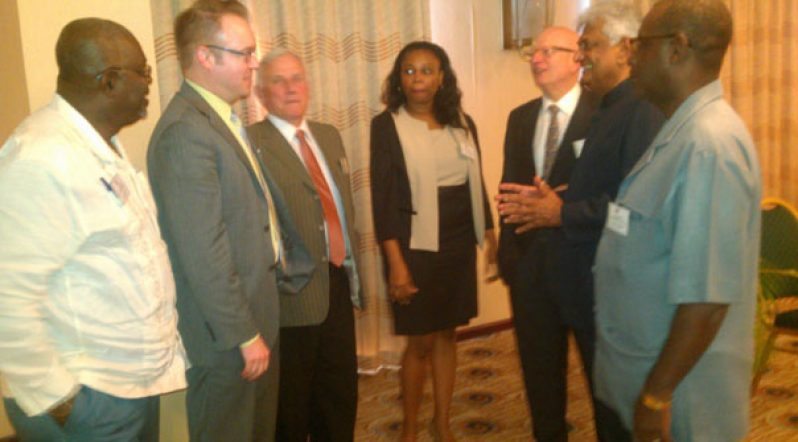–in the interest of accuracy, timeliness when posting results
COGNISANT of the need to tabulate, certify and announce accurate results of elections in a timelier manner, the Guyana Elections Commission (GECOM) is exploring the idea of embarking on a pilot project in which automatic scanning and tabulation machines could be used in a future election.With this in mind, a team of representatives from the DELIAN Project, an independent, non-profit organization registered in Canada and the United States of America, paid GECOM a visit two Mondays ago to conduct a demonstration on the use of automatic ballot scan and tabulation technology.
According to a release from GECOM, the DELIAN team comprised Mr. Jean-Pierre Kingsley, former Chief Executive Officer of the International Foundation of electoral systems and current Chairman of the DELIAN’s Advisory Board, who served as the Chief Electoral Officer of Canada from 1997 to 2010.
Other members of the team were Mr. John Hollins, Chairman of the DELIAN Board of Directors, who was Chief Electoral Officer for the Province of Ontario from 2001 to 2008; and Mr. Allan Best, Managing Director.
DELIAN was created in 2011 as a philanthropic entity by the Canadian elections technology firm, Dominion Voting Systems (DVS), with one of its objectives being to procure and donate electoral technology to emerging and growing democracies. Besides being a signatory to the United Nations Global Compact, it recently joined the Clinton Global Initiative.
It was pointed out during the course of the demonstration that DELIAN could donate up to 25 paper-based, automatic ballot scan and tabulation machines to Guyana for future use at election-time.
Each machine, GECOM said, is capable of handling roughly 1,000 – 1,250 voters on a typical polling day. The automatic ballot scan and tabulation system could be deployed, on a pilot basis, at up to 25 polling stations, as selected by GECOM.
One of the manay advantages of a paper-based, automatic ballot scan and tabulation system solution is that results are tabulated (counted) as they are sent in at close of poll, resulting in the ability to announce results immediately, while still maintaining the comfort of a “paper trail”, should a physical re-count be required.
Another is that the machinery is a form of document ballot voting system, meaning that there is a tangible record of the voter’s intent, even as he or she still marks a traditional paper ballot.
The procedure for using the automatic ballot scan and tabulation system involves: (i) the voter simply using pen and paper to mark his/her intent on the ballot, and (ii) the voter’s ballot paper being confidentially scanned and dropped into a sealed ballot box.
At close of poll, results are tabulated, and the Statement of Poll is printed and shared with polling station officials, and then sent to the Returning Officer through a secure, electronic medium.
In the case of an unclear mark, the ballot scan and tabulation machine returns the ballot to the voter for review and correction, if desired. Finally, the Returning Officer electronically collates and tabulates poll results received from the multiple machines to rapidly and accurately produce consolidated poll results. Of importance, it must be noted that the ballot paper can be used to complete an audit trail if a manual recount becomes necessary.
During their three-day visit here, the DELIAN team also met with key officials of The People’s Progressive Party/Civic and A Partnership for National Unity and the Alliance For Change (APNU). They also paid a visit to Leguan and Wakenaam so as to get a feel of the type of terrain in which the machines could be put to use in any pilot project.
Guyana’s election laws do not currently provide for the use of electronic voting systems. Hence, the laws would have to be amended accordingly, should there be agreement between GECOM and the bona fide Political Parties pertaining to any introduction of the automatic ballot scan and tabulation systems in Guyana.
Witnessing the demonstration, which was conducted in the GECOM Boardroom, were GECOM Chairman, Dr. Steve Surujbally; Commissioners, Ms. Sandra Jones and Mr. Arun Mangar; Mr. Calvin Benn, Chief Election Officer (ag); Mr. Keith Lowenfield, Deputy Chief Election Officer (ag); and technical staff from the Commission’s IT Division.
Subsequent to its visit here, the DELIAN Team conducted a similar demonstration to a wider audience during the 7th Annual General Meeting of the Association of Carribean Electoral Organisations (ACEO), held under the Chairmanship of Dr. Surujbally in Paramaribo, Suriname on January 16-17, 2014.



.jpg)









